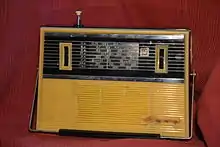VEF Spidola
VEF Spidola (Latvian: VEF Spīdola, Russian: ВЭФ Спидола) was the first mass-produced transistor radio with short wave band in the Soviet Union. It was manufactured by the VEF factory in Riga, Latvia, since 1962. A small series under the name "Spidola" (Спидола ПМП-60[1]) was manufactured since 1960.[2][3] It was named after the fictional witch Spīdola from the Latvian epic poem.
.JPG.webp)
.JPG.webp)

The word "spidola" was a genericised trademark for "transistor radio" for long time in Russian[4] (other synonyms included "transistor").
In many cases, the Spidola was used to listen to Western stations (such as the Voice of America, Radio Free Europe/Radio Liberty, BBC, Deutsche Welle). The criminal prosecution of at least one Soviet dissident involved confiscation of the Spidola as an "instrument of crime," but without specifying the "crime" committed with the confiscated Spidola.[5]
Specifications
First "Spidola" was a ten-transistor, seven-band superheterodyne. Some versions were eight-band.
- Intermediate frequency: 465 kHz.
- Tuning range Longwave, Medium Wave and more than five short wave ranges (13, 16, 19, 25, 31, 41, 49 and 52–75 meters) #.
- Power supply: six D cells, of 9 V total.
- Output power: 150 mW.
- Dimensions: 275×197×90 mm.
- Weight without batteries: 2,2 kg.
- Price (1960s): abt. 73 rubles.
See also
References
- "ПМП-60" stands for Полупроводниковый Малогабаритный Приёмник выпуска 1960 года, or "Semiconductor Compact Receiver, production year 1960"
- "Spidola" (in Russian)
- "Transistor radios of the Soviet Union 1961-1996"
- (russian) «Спидолу» писали с маленькой буквы…//Телеграф, № 56 (294) от 22 марта 2004
- "Processes of past years" (Chronicle of Current Events, issue 33) (in Russian)